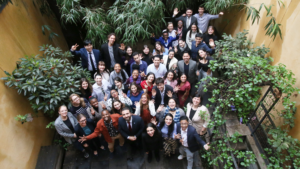I and my fellow WYA members attended a European Youth Workshop and Conference titled “Family, investing in the future” and organized by the Confederation of Family Associations in the Carpathian Basin. The program, which was hosted by Hungarian MEP György Hölvényi from the EPP, took place at the European Parliament.

The speakers addressed the challenges faced by the institution of the family and tried to develop a proper understanding of the issue and engage in a discussion to propose solutions.
Ricardo Ballesteros, from the European Commission on Education, Culture, Youth and Sport, explained the role of the Commission in this field. Although he clearly recognized that family policy falls within the competence of Member States, he agreed the issue should not be ignored in EU institutions. The demographic trend is at the very least worrying (2016 will be the first year with more deaths than births in the EU) and it would be naïve to underestimate it. Leaving aside short-term consequences like economic stagnation and the collapse of the welfare system, he pointed out that ultimately there is no other wealth than the person and EU institutions should deliver the right political messages to underline that.
Following this intervention, Dr. Atila Beneda from the Hungarian Ministry of State for family provided with some examples of the measures taken by the Hungarian government. These measures focused on making work and family life compatible by increasing the offer of child care facilities with mandatory kinder garden from 3 years of age, subsidies for part-time workers and other measures like tax exemptions. These helped both parents to work while taking care of their responsibilities and had actually allowed for a slight increase in fertility rates. However, he also recognized there is still a long way to go.
Ricardo Arroja from the Portuguese association of large families picked up where Mr. Beneda left off and gave a wider picture describing the situation across Europe. Although he did provide examples of positive measures undertaken to protect the family, he stated that families had to cope up with a heavy economic burden with very little help even though they tend to be the ones who contribute the most to society, and not just in a general sense. He pointed out how surveys in almost every country in Europe showed that people wished to have a higher number of children than they actually had but were discouraged by the circumstances. His conclusion was that family as the basic unit of society should and be regarded as an investment rather than and a strain protected as such.
Piroska Komlósi from Gáspár Károli Protestant University went on to talk about marriage as the foundation for the family. She described how our collective thinking has become more egocentric than ever with people refusing to commit to a life relationship. This affected the family, which had been reduced to a unit of consumption, as the divorce rate skyrocketed and fertility sank. The challenge was for people working in education and in the media to develop a proper understanding of the family and transmit it to the youth so they are able to carry on forming stable and functioning families.
In conclusion, the role of the family in society should be recognized not only by governments, both at the national and the international level with all the consequences that follow, but also by our culture which very often turns its back on the family without realizing the consequences. The work of public institutions can have little effect unless it’s backed by a social current that truly realizes the importance of family and decides to invest on it.
—
Written by Fernando Álvarez, a World Youth Alliance Europe intern from Spain.







